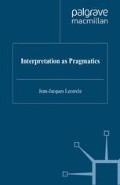Abstract
I repeat, for the sake of convenience, my simplified, and naive version of Jakobson’s diagram: The first concept I need is the concept of actor. When this diagram is embodied in actual dialogue or literary exchange, it involves the real presence of concrete subjects, Greimas’s actors, endowed with material existence. Edward Lear, you and I, but also the text of the sonnet printed on the page are actors in this sense. But the text, although material (contrary to language and the encyclopaedia, which only exist in the limbo of Popper’s third world — the world of concepts and ideas as opposed to the first world of objects and the second world of thoughts) and individual, is not endowed with intention: it is object or patient rather than subject or agent, for the time being at least. The concept of actor, therefore, according to tradition, ascribes a privileged place to author and reader according to the analogy between speech act and interpretation that informs my guiding metaphor. To take this privileged position into account, we might be tempted to modify the initial diagram to a slight extent:
Access this chapter
Tax calculation will be finalised at checkout
Purchases are for personal use only
Preview
Unable to display preview. Download preview PDF.
Notes
D. Lewis, Convention (Oxford, Blackwell, 1969).
J. Lacan, ‘Fonction et champ de la parole et du langage’, in Ecrits (Paris, Seuil, 1966), p. 300.
See J. Searle, Intentionality (Cambridge, Cambridge University Press, 1983), pp. 7–8.
See J. Perry, Personal Identity (Berkeley, University of California Press, 1975).
H. Bloom, The Anxiety of Influence (New York, Oxford University Press, 1973).
See the work of the French linguist, C. Fuchs, Paraphrase et énonciation (Gap, Ophrys, 1994)
C. Fuchs, Les Ambiguïtés du français (Gap, Ophrys, 1996).
J. Derrida, ‘Signature événement contexte’, in Marges de la philosophie (Paris, Minuit, 1972), pp. 365–93;
P. Ricoeur, ‘La fonction herméneutique de la distanciation’, in Du Texte à l’action. Essais d’herméneutique, II (Paris, Seuil, 1986), pp. 101–17.
A. Higgins, Donkey’s Years (London, Minerva, 1995), p. 12.
Quoted in W.B. Gallie, Peirce and Pragmatism (Harmondsworth, Penguin, 1952), p. 118;
H.O. Mounce, The Two Pragmatisms (London, Routledge, 1997), pp. 24–5.
Saki, ‘Reginald’s Peace Poem’, in 76 Short Stories (London, Collins, 1956), p. 29.
J. Austen, Sense and Sensibility (New York, Signet Classics, 1961), pp. 146–7.
B. Aldiss, Frankenstein Unbound (New York, Warner, 1973).
Copyright information
© 1999 Jean-Jacques Lecercle
About this chapter
Cite this chapter
Lecercle, JJ. (1999). Alter Ego. In: Interpretation as Pragmatics. Language, Discourse, Society. Palgrave Macmillan, London. https://doi.org/10.1057/9780230373648_3
Download citation
DOI: https://doi.org/10.1057/9780230373648_3
Publisher Name: Palgrave Macmillan, London
Print ISBN: 978-0-333-68694-2
Online ISBN: 978-0-230-37364-8
eBook Packages: Palgrave Literature & Performing Arts CollectionLiterature, Cultural and Media Studies (R0)

